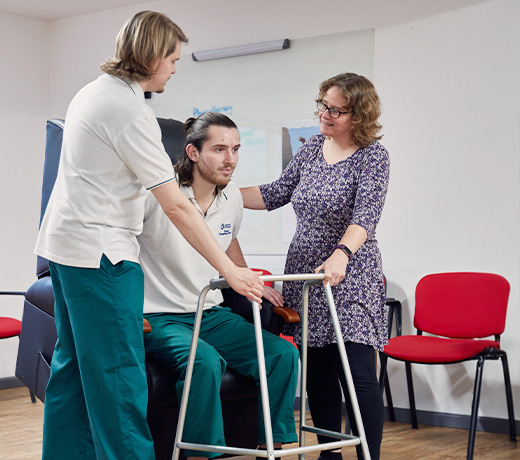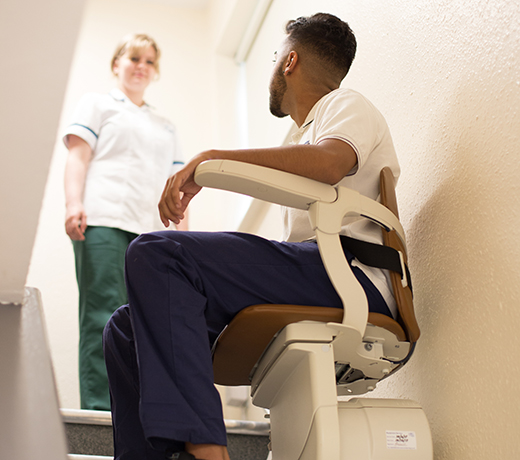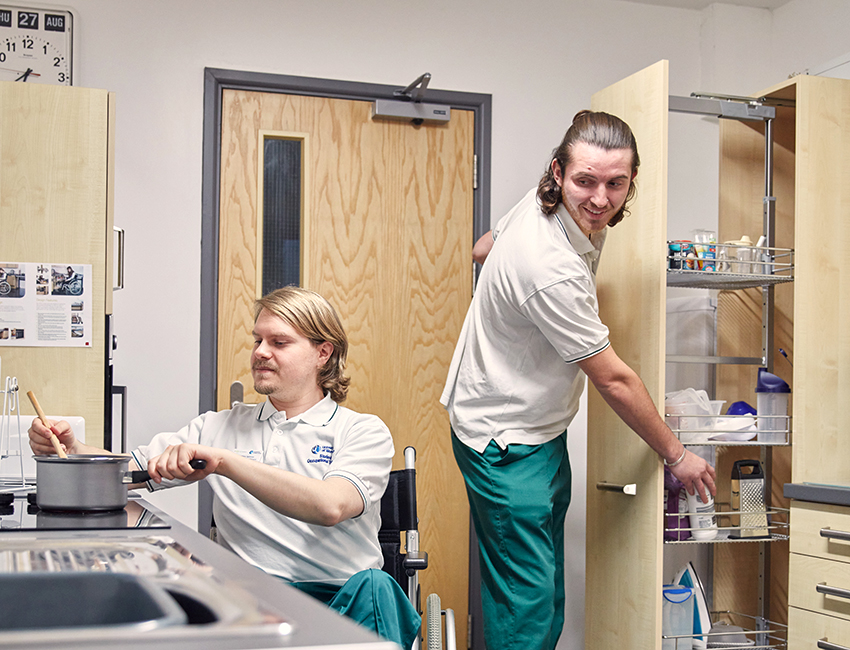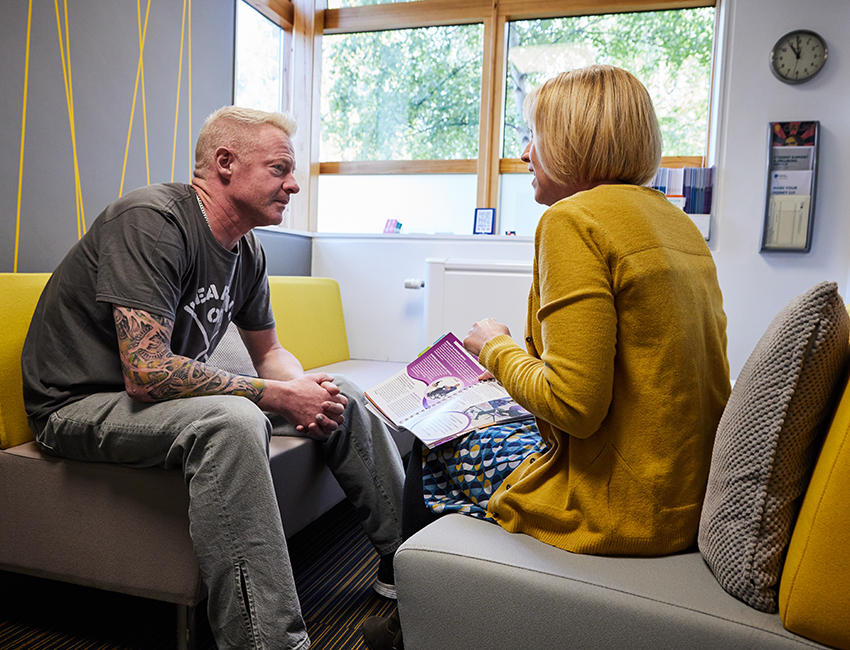At Worcester, you’ll learn from highly experienced healthcare professionals who have worked in a broad spectrum of roles. Once you’ve successfully completed the foundation year, you will be guaranteed to progress onto our three-year Occupational Therapy degree.
for Occupational Therapy graduate prospects
grant that you won't need to pay back
The final three years of this course are accredited by the Royal College of Occupational Therapists and approved by the Health and Care Professions Council. This means that when you graduate, you can register with the HCPC to practice under the protected title of occupational therapist.
First for jobs
The University of Worcester is first in the UK for sustained employment, further study or both, five years after graduation (excluding specialist institutions) - Longitudinal Educational Outcomes Survey 2024. Read more.
Overview
Your first year will build up your knowledge of the fundamentals of human anatomy and the core principles of care. With a focus on key study skills and techniques, the integrated foundation year will ease the transition of studying at degree-level, whether you’re joining us from school, college, or employment.
You’ll study with students preparing for a range of professional courses, including paramedicine, physiotherapy, nursing and diagnostic radiography. This prepares you to collaborate with and work alongside other health and social care professionals, just as you will once you graduate.
By successfully completing the foundation year, you’ll be guaranteed to progress on to our three-year Occupational Therapy degree.
Over the final three years of the course, you’ll be able to put all that you have learned into practice by taking part in a variety of work placements, collecting over 1,000 hours of professional experience.
When on campus, you’ll be taught through a mix of lectures, interactive seminars, and practical skills sessions. You’ll also have access to our specialist skills simulation facilities and Ability House – a converted house with adaptations made to the kitchen, bathroom, and bedrooms where you can practice your skills and become confident working in home environments.
As an occupational therapist, you'll support people who have difficulties carrying out day-to-day occupations (activities). This may be due to physical or mental health difficulties, learning differences, age related changes, transitions in life, trauma, or an intersection of many different things. This could mean adapting the living environment of a person affected by a life-altering injury, supporting those living with dementia, or working with disabled children to participate in school and play.
Placements
There are no placements during the foundation year.
During the final three years of this course, you’ll gain at least 1,000 hours of professional experience as an occupational therapist. Our dedicated placement team organise this for you, giving you a range of varied experiences throughout the course.
Recent placements have included occupational therapy roles in:
- NHS and private hospitals
- Residential mental health facilities
- Woodland therapy settings
- Community rehabilitation teams
- Schools, both mainstream and specialist
- Charities
- Specialist equipment suppliers
What is Occupational Therapy?
Course content
During the foundation year, you’ll study theories backed up by substantial evidence and apply these to your role in healthcare.
Our courses are informed by the latest research and developments in the field, as well as feedback from students and employers. Therefore, modules do occasionally change to keep the course up-to-date and relevant.
All modules are mandatory to ensure you’re eligible to register as an occupational therapist with the HCPC.
Careers
Most of our graduates become registered occupational therapists.
As an occupational therapist, you can work in a huge variety of settings, including:
- NHS and private hospitals
- Schools
- Adult social care settings
- Mental health, learning disability and postural care services
- Outdoor therapy centres
- Specialist equipment suppliers and home adaptation services
- In people’s homes and the community
As occupational therapists, we do not group people by health condition or speciality but address their needs as individuals. Most of our graduates secure their preferred first choice of employment area, and whilst many choose to work within the NHS or social care, others have taken new graduate roles within charities and private health settings.
Our course is recognised by the World Federation of Occupational Therapists, meaning you can also choose to seek employment as an occupational therapist abroad.
Course highlights
Teaching and Assessment
Our course creates career-ready graduates through applied experiences. You’ll be taught via interactive lectures and seminars, and complete practical sessions in the classroom and on professional placement.
Your assessments will help prepare you for your career as a paramedic and will include presentations, case studies, and written assessments, along with innovative assessment methods including creating a podcast.
Teaching and assessment contents
You will be taught through a combination of interactive workshops, lectures, seminars and e-learning. Throughout the Course, you benefit from an integration of both innovative and traditional teaching methods. Large group lectures and cutting-edge research seminars delivered by academics as well as external speakers will complement your studies. Lectures may contain students from a variety of different courses for which the lecture content is also relevant.
A variety of stimulating, cutting-edge resources are also available to support your learning. Your learning will be supported by the University’s virtual learning environment. You will have individual access to electronic journals, content-rich study guides, and interactive online learning materials covering various science disciplines, formative online assessments and group discussion forums.
In tutor-led seminar groups you will investigate key concepts and systems that includes case studies. These small group sessions will also develop your critical thinking, problem design and solving, teamwork, presentation and lifelong learning skills which are essential for your career development.
In addition, meetings with personal academic tutors are scheduled on at least four occasions in the first year and three occasions in each of the other years of a course. Throughout your degree you will have the opportunity to apply your developing knowledge and build on the depth of your understanding.
Entry requirements
UCAS tariff points required: 32
The UCAS tariff points can come from 1 A-level (grade C or above) or an equivalent qualification. You will also need:
- GCSE English and Mathematics at grade c/4 or above
- Clear commitment to pursuing a career in Occupational Therapy
- To be at least 18 years old
However, all applicants will be judged on their individual merits and we may take other skills, qualifications and life experience into account. We welcome mature students without the usual formal qualifications and will consider your application based on your suitability and preparedness to complete the Foundation Year.
The BSc Occupational Therapy with Foundation Year course is aimed at individuals who may have few or no relevant formal qualifications but who can demonstrate a clear commitment to pursuing a career in Occupational Therapy. Personal, professional and educational experiences will be considered to determine motivation and ability to progress onto the degree course.
Any questions?
If you have any questions about entry requirements, please call our Admissions Office on 01905 855111 or email admissions@worc.ac.uk.
Fees
Fees contents
UK and EU students
The Government has announced that it will increase tuition fees and maintenance loans by 3.1% from the 2025/26 academic cycle. Subject to approval, the University intends to increase our tuition fees in line with this and as per our terms and conditions. This means that from September 2025 the standard fee for full-time home and EU undergraduate students on BA/BSc/LLB degrees and FdA/FdSc degrees will be £9,535 per year for new and continuing students.
For more details on course fees, please visit our course fees page.
International students
The standard tuition fee for full-time international students enrolling on BA/BSc/LLB degrees and FdA/FdSc degrees in the 2025/26 academic year is £16,700 per year.
For more details on course fees, please visit our course fees page.
How to apply
How to apply contents
Applying through UCAS
UCAS is the central organisation through which applications are processed for full-time undergraduate courses in the UK.
Read our how to apply pages for more information on the application process, or if you’d like to apply for part-time study.
Contact
If you have any questions, please get in touch. We're here to help you every step of the way.

Admissions Office
admissions@worc.ac.ukAdmissions Office
admissions@worc.ac.uk01905 855111More to explore
Open Days
Visiting us is the best way to get a feel for student life at the University of Worcester.

The City of Worcester
Worcester is a welcoming university city with great transport links and plenty of student parking.

Accommodation
Benefit from our accommodation guarantee. We have rooms on campus to suit every budget including en-suite options.










